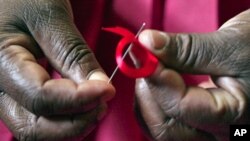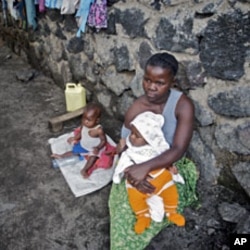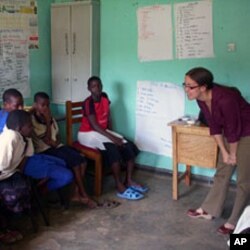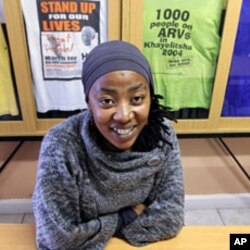Sub-Saharan Africa often evokes images of conflict, famine, and disease. In many cases, women bear the brunt of the region's misfortunes. But new opportunities and constitutions advancing gender parity have opened up the political space for women.
In Rwanda, Chad and other countries, women are allocated up to 30 percent of parliamentary seats. In fact, Rwanda is now the world’s first country where women Members of parliament (MPs) outnumber men.
“These kinds of changes need to be encouraged because without women fully engaged in both civil society as well as formal political office, it will be as if trying to carry forward with only half the sky," said Emira Woods, Co-Director of Foreign Policy in Focus and Associate at the Institute for Policy Studies in Washington.
Gender data in Sub-Saharan Africa. Graphic by VOA's T. Benson
According to a recent United Nations report, Rwandan women legislators have led reform on women's property and inheritance rights and protection against gender violence. These are problems endemic to Sub-Saharan Africa. In Nigeria, for example, Raphael Ogar Oko says his country has failed to provide women with equal opportunities.
|
Your Say "The situation of women has improved ... Women are promoted as ministers, managers, and given a quota of 30% at the national Parliament." - Mahamat Tahir Brahim, Chad "No way women have same opportunities as men in Nigeria." - Ifidon Osadiaye Igbavboa, Nigeria "In most parts of Africa female children are not given the recognition accorded to male children." - Chinny Ogbonna, Nigeria "Women's roles are changing into a more proactive one. But this faces ... ingrained traditional beliefs ... In one place women are treated with respect, in another like slaves." - Eleghasim Greenbel, Nigeria "The status of the Nigerian women has greatly improved ... Wife beating or battering has also reduced to some extent." - Sandra Ayo Onuora, Nigeria "We have more women going to higher institutions of leaning and contributing positively to the economy." - Joseph Bwalya of Zambia |
He says women face discrimination at almost every level. “Women … are regarded as second class citizens who are denied every opportunity and discriminated against ... At the family level discriminatory practices involve no rights to inheritance of their parents’ assets and no full member of spouse's family.”
These practices often lead to other complications. In Ethiopia, feminist, blogger and poet Billene Seyoum says women, who have been left out of male-dominated sectors like finance and banking, both as decision-makers and beneficiaries of credit and bank services, face obstacles ranging “from sexist loan officers who deem women credit un-worthy to the bottlenecks created by banking solutions that do not put into consideration the needs of women, i.e. difficulty in putting up collateral against a loan since property is often under the male head of household.”
In order to fill the vacuum, Seyoum has been working with the founders of a bank focused on women, the first all-woman group of its kind in Ethiopia. “And it is the only bank in Ethiopia which has a 64 percent female shareholder profile from 7,000 shareholders, indicating what will hopefully be a growing trend for women’s full participation in a sector that has not tapped into our potential to be active contributors and beneficiaries,” said Seyoum.
Gender HIV/AIDS data. Graphic by VOA's T. Benson
Mary Ellsberg, Vice President of research and programs at Washington's International Center for Research on Women says gender discrimination is often due to "women's powerlessness and their status in society." This is particularly true in communities hit by HIV/AIDS, where widows are typically the most vulnerable to losing their land and property. Ellsberg says women's rights movements are pushing hard to address the land grab taking place around HIV.
That is important because Sub-Saharan Africa has the world’s highest rates of HIV/AIDS. Ellsberg says endemic gender violence and sexual violence used as a weapon of war contribute to HIV transmission as well as prevent many women from disclosing that they have HIV for fear of persecution.
According to feminist researcher and activist Françoise Mukuku, up to 50 women are raped every day in the DRC. Mukuku says the “rate of HIV has gone high since the conflict because women are raped and, in fear of stigma, they don't denounce, don't tell it to their sexual partner and don't go to hospital whether because it is far or because they don't have money for treatment or because they don't want to be stigmatized. Those men in return continue to have [multiple] sexual partners,” said Mukuku.
"Older men who might be HIV infected already are particularly interested in young women because they perceive them to be ... less likely to be infected," Ellsberg said.Young women are the most vulnerable to HIV/AIDS and the group where the epidemic is rapidly growing. Ellsberg says forced child marriage contribute to the spread of the disease because married women typically do not have the ability to protect themselves.
Karen Austrian, a Population Council Associate in Nairobi says the disease poses a big challenge for adolescent girls in the 15-24 age range, who incur long-term, irreversible damage, including loss of schooling and livelihood, and the risk of passing on HIV to their children. Kenyan girls, age 15-19, for example, are four times more likely than boys to contract HIV/AIDS, says Austrian. As a result, she says girls, who typically drop out of school at higher rates than boys and are often excluded from health education, have no relationships of trust, no mentors, or a safe social space to turn to.
But women have been scrambling to find solutions. Emira Woods says women probably paid the heaviest price for HIV/AIDS. “Women are caregivers. When health infrastructures are poor or weak or non-existent, it’s women who have stepped in to provide for the needs of family members to give that care, often uncompensated,” said Woods.
In southern Africa, where HIV/AIDS has reached dramatic proportions, women within infected communities have been fighting for affordable medicines to combat the disease.
"It is a testament to the strength and resilience of women that you see organizations like Truth in Action Campaign - founded in South Africa, founded by those who were impacted by the disease themselves, who refused to be objects of history - that they took their own destiny in their own hands and began to really fight for access to treatment for all people, particularly in poor and marginalized communities," said Woods.















